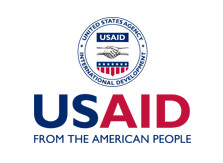|

With help from the local community coalition, mothers and their children are transported from hard-to-reach riverine areas to immunization points |
Success Story
Rural Social Entrepreneurs Boost Immunization Coverage
Lagos State, Northern Nigeria, January 2008
Tucked securely in an old canoe, mothers and children chorused popular traditional songs as they traveled to the nearest routine immunization post some 8 kilometers away from Ajara, a remote rural community in Badagry Local Government Area in Lagos State. It was another immunization day and as usual, the capable hands of sixty-five-year-old J.J. Koklanu paddled them around the multitude of logs that obstructed the river.
Though several other expert paddlers live in the area, only Koklanu provides free transport to the immunization post so that cost of travel does not stop children from receiving life saving vaccines. With a megaphone in hand, he attracts children and their mothers to points of departure by telling of the importance of routine immunization and offering them free rides to the post. According to a resident in the area Alaba Lunyinsode, “There were high levels of childhood illnesses and parents mostly resorted to traditional medicines because of the distance to the health facility. Sometimes, the medicines caused more harm and led to the death of several children.” Frequent malaria and water borne diseases also saddled the mainly farming and fishing population.
Throughout Nigeria, high rates of illness and death in children under the age of five are mainly caused by treatable and preventable diseases such as malaria, measles, diarrhea and acute respiratory infections. At the same time, more than half of Nigerian children are malnourished due to low rates of exclusive breastfeeding, poor quality of food, and simply not enough to eat. This is besides parents' lack of basic knowledge and management of childhood illness. According to UNICEF, 22% of child deaths in Nigeria - amounting to 200,000 deaths per year - could be prevented by vaccines.
Guided by the COMPASS Project, Koklanu and other community members in Ajara are spearheading grassroots initiatives to improve health and education outcomes. As chairperson of the COMPASS-supported community coalition in the area, Koklanu leads by doing. Since 2005, he has single-handedly improved access to immunization services and increased vaccination coverage by ferrying children and their mothers to the closest immunization point..
|
“Guided by the COMPASS Project, Koklanu and other community members in Ajara are spearheading grassroots initiatives to improve health and education outcomes." |
Thankful mothers express their delight and appreciation for his support over the years. “They now look forward to the trips,” said community member, Chief Michael Zannu. “The kids like the sound of his megaphone, they like his approach,” he concluded. When asked of his motivation, he said “I grew up in this community and I am thankful for the opportunity to live and learn. I am a bit old now and I do this for the children who are the future of our community.” Thanks to Koklanu, 2,477 children in Ajara have been immunized.
In several communities where COMPASS works, social entrepreneurs like Koklanu are stepping-up to the task, contributing their skills and resources to improve the quality of life. The community in Ajema has contributed money to operate a local dispensary which maintains a revolving drug supply. COMPASS supported the effort by training community health promoters on how to provide basic health services. As a result of COMPASS and the community's efforts, malaria cases reduced by 87.4%, from 253 in January to 32 in September 2007, according dispensary records,
Through its Nigerian partner networks, community coalitions, and community health promoters, COMPASS is increasing utilization and quality of appropriate health services for immunization. The child survival activities are based in 37 Local Government Areas in Kano, Lagos and Nasarawa States. The COMPASS Project is funded by the United States Agency for International Development (USAID).
|
